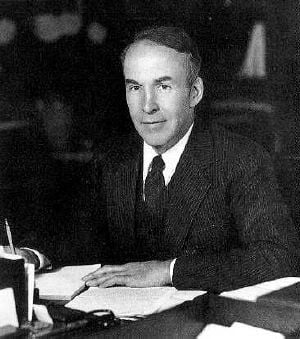Archibald MacLeish
Archibald MacLeish (May 7, 1892 – April 20, 1982) was an American poet, writer and the Librarian of Congress. He is associated with the modernist school of poetry.He was awarded the Pulitzer Prize three times.
Biography
MacLeish was born in Glencoe, Illinois. His father, Andrew MacLeish, worked a dry-goods merchant. His mother, Martha Hillard, was a college professor. He grew up on an estate bordering Lake Michigan.
He attended the Hotchkiss School from 1907 to 1911, before moving on to Yale University, where he majored in English and became a member of the Skull and Bones secret society. He then enrolled in the Harvard Law School. In 1916, he married Ada Hitchcock.
His studies were interrupted by World War I, in which he served first as an ambulance driver and later as a captain of artillery. He graduated from the law school in 1919. He taught law for a semester for the government department at Harvard, then worked briefly as an editor for The New Republic. He next spent three years practicing law.
In 1923 MacLeish left his law firm and moved with his wife to Paris, where they joined the community of literary expatriates that included such members as Gertrude Stein and Ernest Hemingway. He returned to America in 1928.
From 1930 to 1938 he worked as a writer and editor for Fortune Magazine, during which he also became increasingly politically active, especially with anti-fascist causes. He was a great admirer of Franklin D. Roosevelt, who appointed him Librarian of Congress in 1939. According to MacLeish, Roosevelt invited him to lunch and "Mr. Roosevelt decided that I wanted to be librarian of Congress". MacLeish held this job for five years. Though his appointment was officially opposed by the American Library Association because of his lack of professional training as a librarian, he is remembered by many as an effective leader who helped modernize the Library.
During World War II MacLeish also served as director of the War Department's Office of Facts and Figures and as the assistant director of the Office of War Information. These jobs were heavily involved with propaganda, which was well-suited to MacLeish's talents; he had written quite a bit of politically-motivated work in the previous decade.
He spent a year as the Assistant Secretary of State for cultural affairs and a further year representing the U.S. at the creation of UNESCO. After this, he retired from public service and returned to academia.
Despite a long history of criticizing Marxism, MacLeish came under fire from conservative politicians of the 1940s and 1950s, including J. Edgar Hoover and Joseph McCarthy. Much of this was due to his involvement with anti-fascist organizations like the League of American Writers, and to his friendship with prominent left-wing writers.
In 1949 MacLeish became the Boylston Professor of Rhetoric and Oratory at Harvard. He held this position until his retirement in 1962. In 1959 his play J.B. won the Pulitzer Prize for Drama.
From 1963 to 1967 he was the John Woodruff Simpson Lecturer at Amherst College. Around 1969/70 he met Bob Dylan who describes this encounter in Chronicles,_Vol._1.
External links
Literary work
MacLeish greatly admired T. S. Eliot and Ezra Pound, and his work shows quite a bit of their influence. In fact, some critics charge that his poetry is derivative and adds little of MacLeish's own voice.
MacLeish's early work was very traditionally modernist and accepted the contemporary modernist position holding that a poet was isolated from society. His most well-known poem, "Ars Poetica", contains the line "A poem should not mean/but be", a classic statement of the modernist aesthetic.
He later broke with this position. MacLeish himself was greatly involved in public life and came to believe that this was not only an appropriate but an inevitable role for a poet.
Awards
1933 Pulitzer Prize for poetry
1953 Pulitzer Prize for poetry
1953 National Book Award
1953 Bollingen Prize in Poetry
1959 Pulitzer Prize for Drama
1959 Tony Award for Best Play
1965 Academy Award for Documentary Feature
1977 Presidential Medal of Freedom
Quotes
"We are deluged with facts, but we have lost or are losing our human ability to feel them".
"What is more important in a library than anything else — is the fact that it exists".
"A man who lives, not by what he loves but what he hates, is a sick man".
Cateogry:Art, music, literature, sports, and leisure
Credits
New World Encyclopedia writers and editors rewrote and completed the Wikipedia article in accordance with New World Encyclopedia standards. This article abides by terms of the Creative Commons CC-by-sa 3.0 License (CC-by-sa), which may be used and disseminated with proper attribution. Credit is due under the terms of this license that can reference both the New World Encyclopedia contributors and the selfless volunteer contributors of the Wikimedia Foundation. To cite this article click here for a list of acceptable citing formats.The history of earlier contributions by wikipedians is accessible to researchers here:
The history of this article since it was imported to New World Encyclopedia:
Note: Some restrictions may apply to use of individual images which are separately licensed.
